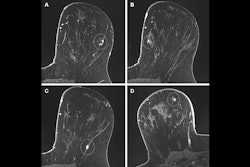Younger women may benefit most from preoperative MRI for reducing their chances of breast cancer recurrence, according to research published October 21 in Radiology.
A team led by Heera Yoen, MD, from Seoul National University Hospital in South Korea, found significant associations between preoperative MRI and a lower risk of ipsilateral in-breast recurrence in women with newly diagnosed breast cancer at age 50 or younger. And women with hormone receptor-negative cancers may benefit most.
“By focusing on young patients with breast cancer and stratifying outcomes on the basis of hormone receptor status, our study provides valuable insights into the subgroups that may benefit most from tailored preoperative MRI,” Yoen and colleagues wrote.
The debate continues on the pros and cons of outcomes from preoperative MRI for women with breast cancer. While MRI can detect additional lesions missed at mammography, it can also lead to higher false-positive and biopsy rates, leading to higher costs and treatment delays.
Younger women often have delayed breast cancer diagnoses, which may be due to less concern about and awareness of breast disease among these women. As well, mammography has limitations when it comes to imaging dense breast tissue, which is more often found in younger women.
Data are lacking regarding preoperative MRI’s long-term outcomes in young women, Yoen and co-authors noted. They investigated potential associations of the modality with recurrence and survival outcomes in women aged 50 or younger with newly diagnosed breast cancer and assessed the impact of hormone receptor status on these associations.
The study included 4,414 women with an average age of 43. Of the total cohort, 4,118 underwent preoperative MRI while 296 did not, and 342 experienced breast cancer recurrence.
Women in the MRI group had a lower five-year cumulative incidence of ipsilateral in-breast recurrence compared to women in the no-MRI group. This was especially true for women with hormone receptor-negative cancer.
Comparison between women who undergo, omit preoperative MRI | ||||
Measure | No-MRI | MRI | p-value | Subdistribution hazard ratio (sHR) |
| Recurrence rate (overall) | 3.3% | 1.6% | 0.04 | 0.49 |
| Recurrence rate (hormone receptor–negative cancer) | 20.7% | 8.2% | 0.04 | 0.4 |
However, the team also reported no evidence showing differences in total recurrence and overall survival between the two patient groups. This included sHR values of 0.7 for recurrence and 0.62 for survival.
The authors highlighted that, with these results in mind, selective use of preoperative MRI could lower the risk of recurrence in younger women with newly diagnosed breast cancer who plan to undergo surgery, and could take the increasing incidence of breast cancer in young women into account.
“Without preoperative MRI, these undetected lesions might become evident as recurrences, unless effectively managed with adjuvant therapy,” they wrote.
Read the full study here.




















